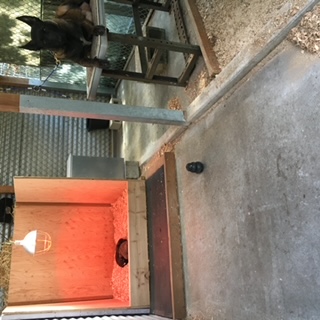
Part 3 How I Got Started Holistic Breeding and Training Dogs
Jul 15, 2025Story part 3 of 4.
In addition to starting with these basic herbal remedies, I emphasize the importance of a natural diet. The dogs are fed high-quality, natural foods free from artificial additives and preservatives. Allowing me to feed dogs at all stages, from reproduction, to lactation, to infant puppies, to athletic growing puppies, to working dogs to mature to elderly. I believe that a natural diet contributed significantly to the dogs' overall health and well-being, ensuring they were in optimal condition for breeding. This approach helped maintain dogs' physical health, supported their immune systems, and provided the necessary nutrients for healthy reproduction.
Creating a stress-free environment was another crucial aspect of my holistic approach. While it is not possible to live stress free, I began to ensure that the dogs had fresh air, natural light and ample space for exercise and mental stimulation through training and co-mingle housing environment. A calm and nurturing atmosphere was maintained to reduce stress, which I believed was essential for the mother dogs' overall health and reproductive success. This included providing a stable routine, minimizing exposure to loud noises and stressful situations, and offering plenty of social interaction and affection through training with pregnant mothers and puppies in her care.

By integrating these holistic approaches, I gained the ability to provide a comprehensive and natural care regimen for the breeding dogs and puppies. This method not only addressed the limitations of conventional veterinary medicine but also promoted the long-term health and well-being of the dogs, ensuring successful breeding and healthy offspring. That go on to become athletic pets, working dog and support animals for disabled people.
One significant challenge was the side effects associated with conventional medications. I observed that many pharmaceutical treatments, while effective in addressing specific health issues, often came with adverse side effects that could compromise the overall well-being of dogs. These side effects sometimes included digestive problems, lethargy, and allergic reactions, which could be particularly detrimental to breeding dogs and puppies.
Another issue was the limited effectiveness of conventional treatments in addressing chronic conditions. I found that traditional veterinary medicine often focuses on treating symptoms rather than addressing the root causes of health problems. This approach sometimes resulted in recurring issues and a reliance on continuous medication, which the I believed was not sustainable for the long-term health of the young dogs in training or the breeding males and female dogs.
I also encountered challenges with the overuse of antibiotics. While antibiotics were necessary for treating bacterial infections, their frequent use led to concerns about antibiotic resistance and the potential weakening of the dogs' immune systems. I sought alternative methods to prevent and treat infections without relying heavily on antibiotics.
Additionally, I was frustrated by the lack of personalized care in conventional veterinary practices. They felt that traditional approaches often followed a one-size-fits-all model, which did not consider the individual needs and conditions of each of my breeding dogs or puppies. This lack of tailored care for breeders and their young sometimes resulted in sub-optimal treatment outcomes.
Lastly, I was concerned about chemical exposure from conventional treatments. Many pharmaceutical products contain synthetic chemicals that I believe could have long-term negative effects on the puppies and breeding dogs' health because the company themselves said it does. While there is need for chemical-based flea and tick preventives, I sought to replace them with natural alternatives for my young puppies and mothers when possible.
I utilized a variety of herbal remedies to maintain the health and reproductive integrity of their breeding dogs. These remedies were chosen for their natural medicinal properties and effectiveness in addressing common health issues. Here are some details on the specific herbs and their uses:
- Echinacea: This herb was used to boost the immune system of the dogs. It helped in preventing infections and enhancing the overall health of the dogs, especially during stressful periods such as breeding and whelping.
- Chamomile: Known for its calming properties, chamomile was used to reduce anxiety and stress in the dogs. It also had anti-inflammatory effects, which were beneficial for treating minor skin irritations and digestive issues.
- Garlic: Garlic was included in the dogs' diet for its natural antibiotic properties. It helped in preventing infections and was also effective in repelling parasites such as fleas and ticks.
- Milk Thistle: This herb was used to support liver health. It helped in detoxifying the liver and improving its function, which was particularly important for dogs that had been exposed to various medications or environmental toxins.
- Calendula: Calendula was used for its healing properties. It was applied topically to treat wounds, cuts, and skin irritations. It also had anti-inflammatory and antimicrobial effects, which helped in preventing infections.
- Ginger: Ginger was used to aid digestion and alleviate gastrointestinal issues. It was particularly useful for dogs that experienced nausea or vomiting, especially during pregnancy.
- Turmeric: Known for its anti-inflammatory and antioxidant properties, turmeric was used to support joint health and reduce inflammation. It was beneficial for older dogs or those with arthritis.
These herbal remedies were integrated into the dogs' care regimen to promote their overall health and well-being, ensuring they were in optimal condition for breeding. At the present day I use these basic herbs along with others that are effective and safer for me to use to care for my dog pack when compared to conventional medications or supplements.
Part 4 the final piece of my story, how I got started holistic breeding and training dogs!
Stay connected with news and updates!
Join our mailing list to receive the latest news and updates from DTC.
Don't worry, your information will not be shared.
We hate SPAM. We will never sell your information, for any reason.




